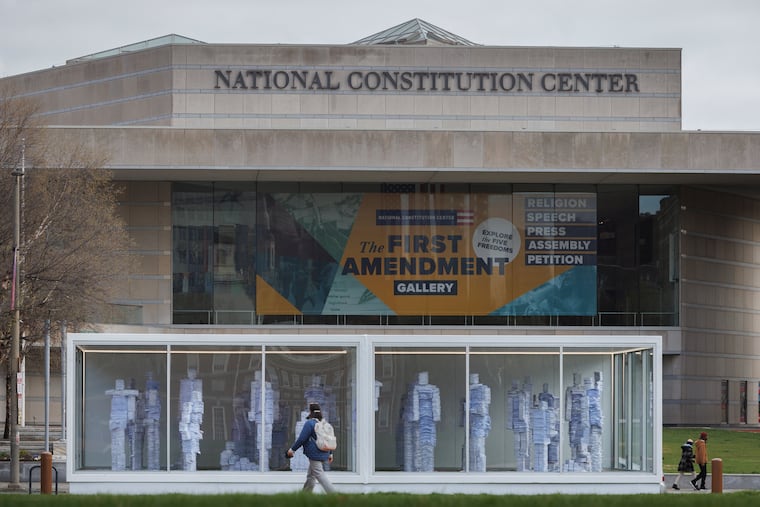Hiring people with criminal records benefits everyone, says JPMorgan Chase in a new art installation
JPMorgan Chase is leading local efforts to build pathways to employment for people with criminal records for Second Chance Month.

Last night, stacks and stacks of intricately placed paper were laid on Independence Mall.
A new art installation open to the public Thursday morning, Waiting Workforce, is a call to action as part of Second Chance Month this April. Thirty-eight figures made from stacks of paper stand together waiting, meant to represent the majority of U.S. states that have yet to pass laws which automatically clear some criminal records.
Without automatic record sealing, the process can be complex, time consuming and full of paperwork for people whose records would otherwise be eligible for sealing or expungement. Pennsylvania was the first state to enact automatic sealing in 2018, and its legislation was updated and expanded in 2024 to allow for some felony convictions to be sealed.
But those Clean Slate laws don’t cover all individuals or all justice system interactions immediately.
Having a documented history of justice system interaction often makes it difficult for people to get good jobs and advance in their careers. And even when a person with a criminal history can get their foot in the door to be considered for jobs, hiring managers can be biased against those applicants.
According to a national survey by the Alliance for Safety and Justice, more than half of individuals with a past criminal conviction have had difficulties getting a job, maintaining employment or making a living.
“We all know somebody who can use a second chance”
It’s why JPMorgan Chase is advocating for more Second Chance opportunities in Philadelphia with the Waiting Workforce installation, and other activations, this month building off the state’s pioneering work with Clean Slate.
“A lot of the people who get caught up in [the justice system] are aware, but there’s not necessarily a broader awareness of the impact that this is happening on individuals and their ability to get into good jobs with career pathways and create more economic opportunity for themselves and their families,” said Nan Gibson, executive director of the JPMorgan Chase Policy Center.
“We all know somebody who can use a second chance,” she said.
After Pennsylvania passed its Clean Slate law in 2018 and Utah followed with bipartisan legislation, JPMorgan lawyers worked with advocates in states like Michigan, Connecticut, Delaware, Colorado and New York to pass similar legislation.
In addition to Waiting Workforce, JPMC is hosting a day-long conference today at the Wharton Business School on the “Business Case for Second Chance Employment,” which brings together business executives, academics, community members and other leaders, like Philadelphia Federal Reserve President Patrick Harker, together to discuss building more Second Chance pathways for hiring.
“It’s the right thing to do, and it’s good for the economy.”
A coalition of like-minded businesses
JPMC also has recently expanded its Second Chance Business Coalition, a group of organizations leading and collaborating on Second Chance hiring efforts, to 50 members, most recently adding the NBA.
“It’s the right thing to do, and it’s good for the economy,” Gibson said about creating more opportunities for people with criminal records.
She referenced a report from the Brennan Center for Justice, which estimated that felony convictions keeping people from working costs the economy roughly $77 billion, and an additional $240 billion because of misdemeanor convictions.
Gibson said JPMC has been focused on Second Chance hiring internally, too. About 10% of JPMC’s nationwide new hires last year had a criminal record, she said. Roughly 80 million Americans have one.
“That doesn’t impact the safety and soundness of the financial industry or the financial system,” she said.
Changing the narrative
Jason Whyte, the founder and CEO of the National Reentry Workforce Collaborative, a Philly-based group that advocates for and trains other organizations on reentry workforce development, said they make the case to businesses that Second Chance hiring is not charity, but makes its workforce stronger.
“You’re not going to the employers to ask for a favor. You’re bringing [them] the most valuable asset that they could ever have, which are their employees,” he said.
» READ MORE: The Inquirer is launching the Up for Review initiative to consider requests to update old stories
NRWC is one of the members of JPMC’s Second Chance Business Coalition, and is currently working with Philadelphia Works to develop training programs for people with criminal histories that lead to employment in partnering companies.
Whyte said that an important part of their work will be teaching these organizations how to build meaningful relationships with Second Chance workers that last after they transition into their new careers.
“You’re not going to the employers to ask for a favor.”
Without that supportive environment, Whyte said a person is less likely to succeed.
“When a person goes through the process of incarceration, there’s so much [of a] challenge that they have to deal with when they come back ... it requires, really, an ecosystem to be coordinated for it to be really effective at scale,” he said.
JPMC has also hosted free expungement clinics since 2021. Its first clinic this month was held in Philadelphia on Wednesday, but another is coming up April 29 in Delaware.
The Second Chance Record Clearing Clinic and Employment Fair at Delaware State University will take place from 10 a.m. to 2 p.m. in the Student Center, located at 1200 N. Dupont Highway in Dover.
For organizations interested in Second Chance resources and information, like how to enhance their hiring practices, and more details on the business case for hiring workers with criminal histories, free, open-source resources are available at secondchancebusinesscoalition.org.